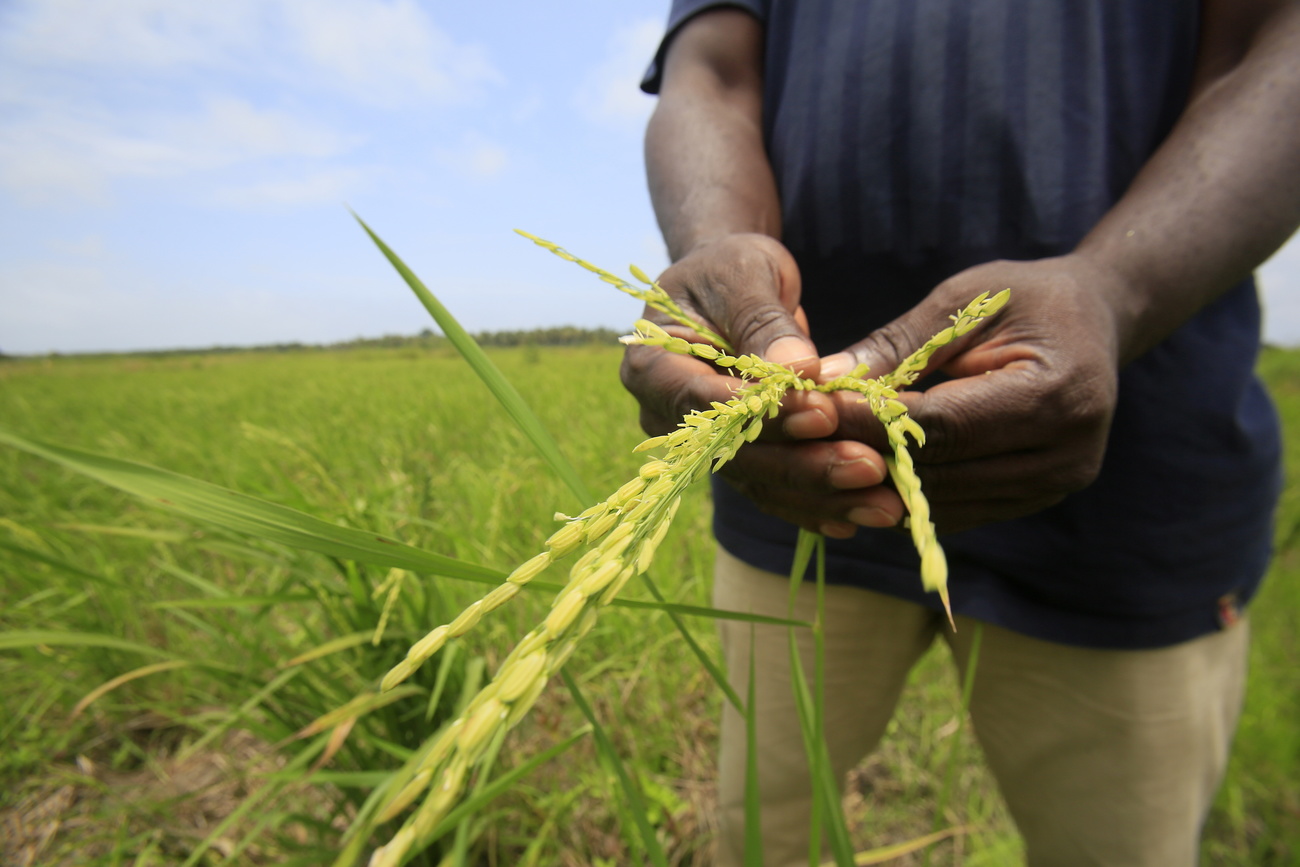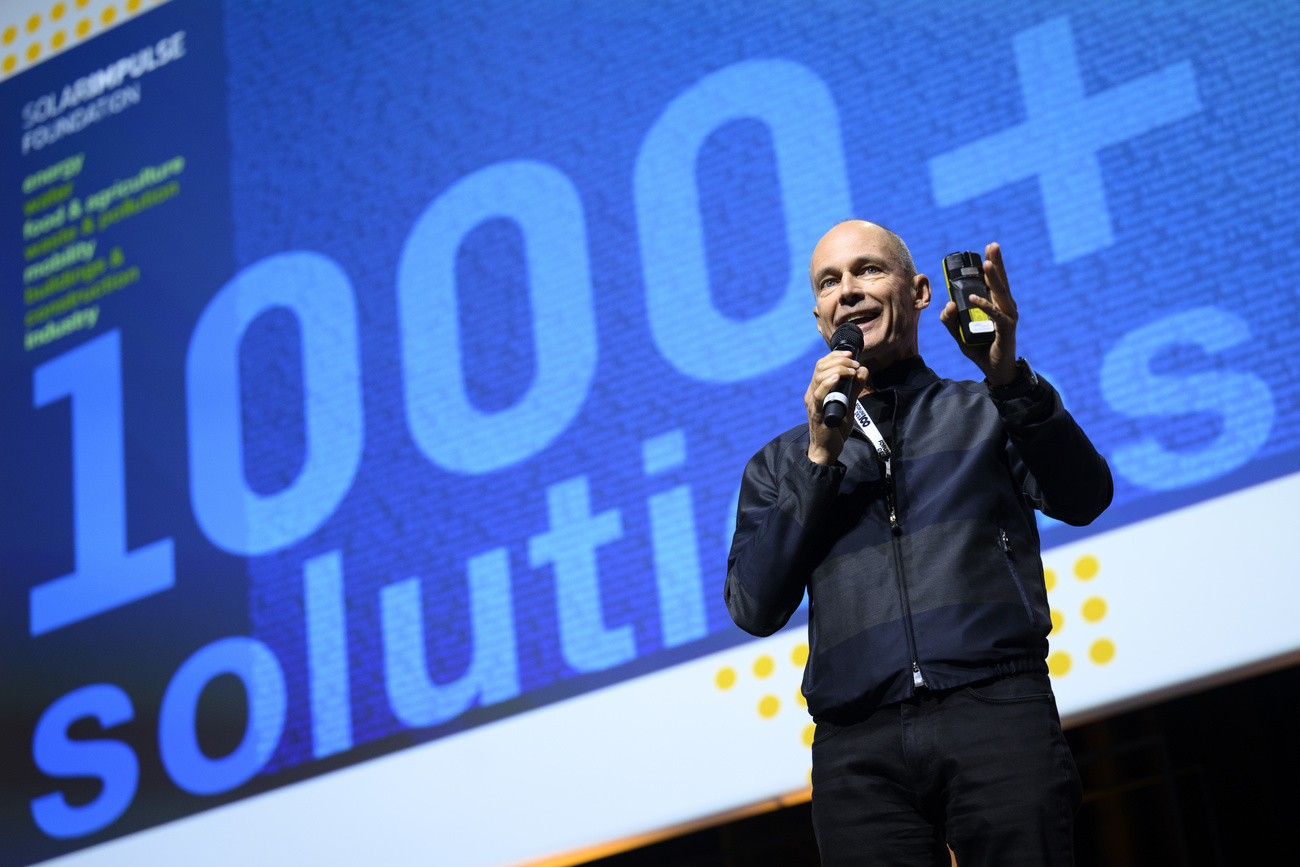Swiss pioneering carbon offsets on the stand at COP27

Switzerland is among the countries keen to push for more offsetting deals which were institutionalised during COP26 last year. But these are proving to be not only controversial, but complex, to set up.
On Monday, Switzerland announced its first carbon offsetting projectExternal link, with Ghana, after rules were set during the COP26 held in Glasgow last year on how governments should operate offsetting projects. The deal would allow the Swiss government’s carbon emissions to be cancelled out through the financing of sustainable rice production in the African country.
This comes following an earlier agreement signed with Peru in 2020 involving financing cookstoves in rural areas that would reduce the amount of wood used by residents to offset emissions from transport in Switzerland.
Carbon offsetting allows polluting countries or companies to purchase carbon credits to offset their own greenhouse gas emissions. The money is then funneled to projects around the globe that prevent or remove the equivalent amount of carbon.
As these country-to-country agreements proceed, questions of the fairness of the scheme have been posed, just as developing countries most affected by climate change are asking for more funding. Some critics have said that such offsets under the relevant Article 6 of the Paris Agreement could soften wealthy countries’ efforts to reduce carbon emissions at home, while putting more of a burden on poorer countries.
The Paris Agreement’s Article 6, clarified in COP talks last year, sets out principles for how countries can pursue voluntary cooperation to reach their climate targets, but a detailed agreement on implementation could take years. Unresolved issues include: the lack of a global overarching regulatory framework and how to ensure countries are not investing in projects that would have taken place regardless of offsetting schemes financed by a rich country.
Switzerland has pledged to cut its global warming emissions by 50% by 2030 compared to 1990 levels. The government expects much of those emission cuts to come from offsetting agreements with poorer countries, that include Dominica, Georgia and Senegal. In total it plans to offset up to 12 million tonnes of CO2 emissions, one-third of its planned reductions.
In 2021, a referendum on a new climate law, that had pushed for more ambitious cuts, was rejected, leaving the government to extend the current CO2 law till 2024. Recently, parliament began to discuss the revision of the law that would apply for the following five years.
Fairness and complexities
With more deals in the works, Switzerland defends its emissions reduction strategy and reliance on offsetting schemes to reach its climate goals. Referring to the offsets, Environment Minister Simonetta Sommaruga told SWI that beyond domestic emissions cutting pledges made under the Paris Agreement, “It’s a win-win situation if Switzerland can also promote projects that are interesting and good for developing countries, that represent investments they would otherwise be unable to achieve and improve those countries’ climate situation, while allowing Switzerland to count the carbon reductions.”
For Veronika Elgart, deputy head international climate policy at the Swiss environment ministry, it was important that agreements take into account the needs and carbon-cutting pledges of host countries. “There should be strategies in each country on how to best use carbon markets to be mutually supportive,” she said.
But David Knecht of the Swiss Catholic Lenten Fund, an NGO that supports food security, sustainable development and gender justice programmes, had his doubts about the official offsetting schemes.
He said the project in Peru was not one that Switzerland should be promoting. “The technology shared with communities was known for many, many years. Already seven years ago we were told that it was not innovative. We should be sure as a country that such projects offer technological advances for the host countries, so that they could benefit from technology transfer.”
There is also concern that such deals involve projects that may have in any case taken place in developing countries, counter to one of the conditions in the Paris Agreement, that of avoiding what is called additionality.
At a panel held at the COP, another issue that was discussed here was regarding the complexity of the carbon offsetting schemes. Christian Fleischer, a PhD student who has done research at Federal Institute of Technology in Zurich, said that for developing countries, concern that the high costs of engaging in the process of carbon offsets, could outweigh the benefits gained. Participation in such schemes is complex, he said, starting with ensuring that partner countries already have registries to account for and report their own emissions.
As a result of such complexities, experts like Fleischer, who works with a consultancy called Perspectives Climate Group, advise that developing countries develop peer exchanges among countries embarking on such schemes. Japan announced a programme that would provide technical support to developing countries in concluding carbon offset agreements.
Fleischer’s colleague at the research group, Aayushi Singh, said, “We have everything on paper (in international agreements), but when you implement the scheme, it does not come across with what we would like to see. We need guidance documents on how to operationalise principles in a way that a price crash in carbon offsetsExternal link is not repeated, and to ensure that there is enough demand in the market for the credits.”
Carbon credit pricing experienced a dramatic drop following the invasion of Ukraine, when other financial markets were also hit. Ongoing global economic pressures have generated concern that pricing will be put under further downward. Since 2015 the price of carbon emissions in the European Union has increased from €5 per tonne to about €25 today, figures from the European Energy Exchange show. In March it slumped to €15 per tonne.
The World Bank estimates that at least 46 countries are now pricing emissions though carbon taxes or emissions trading schemes. That compares with 40 in 2015. Some developing countries say that pricing of carbon credits from nature-based projects, such as forests, is too low, and that the pricing process lacks transparency.
Many of the government schemes now being advised by various advisory groups, such as Perspectives Climate Research here at COP27, have borrowed techniques from private offsetting initiatives that already began in the 1990s as well as agreements concluded by countries, such as Switzerland as a result of the Paris Agreement.
“It does take time, but we would like to see that going faster,” said Hugh Galway, head of carbon markets at The Gold Standard, a Geneva-based organisation that sets standards in carbon markets, said about the process of setting up offsets for countries. “What is certain is that capacity building is needed in many countries that want to be sure that they get it right.”
Need for solid standards
Ahead of the climate summit, Ngozi Okonjo-Iweala, Director-General of the World Trade Organization in Geneva, expressed her own concern over what she said was a growing “fragmentation” in carbon trading and pricing systems, where pricing and standards varied. “We cannot allow for fragmentation so late in the game of climate change,” she said.
A recent report on greenwashing by football World Cup host Qatar claims it was using controversial means of offsetting emissions underscores the issue of questionable standards in use.
Galway said there was concern about some systems being used, including in so-called voluntary carbon markets, employed by the private sector, in particular. “We are worried about some organisations which are setting up standards which don’t think about additionality that is needed and which do not think about proper safeguards and do not consult local stakeholders properly.”
Edited by Virginie Mangin

More
‘Even if you don’t care about climate, these solutions make sense’

In compliance with the JTI standards
More: SWI swissinfo.ch certified by the Journalism Trust Initiative

You can find an overview of ongoing debates with our journalists here. Please join us!
If you want to start a conversation about a topic raised in this article or want to report factual errors, email us at english@swissinfo.ch.